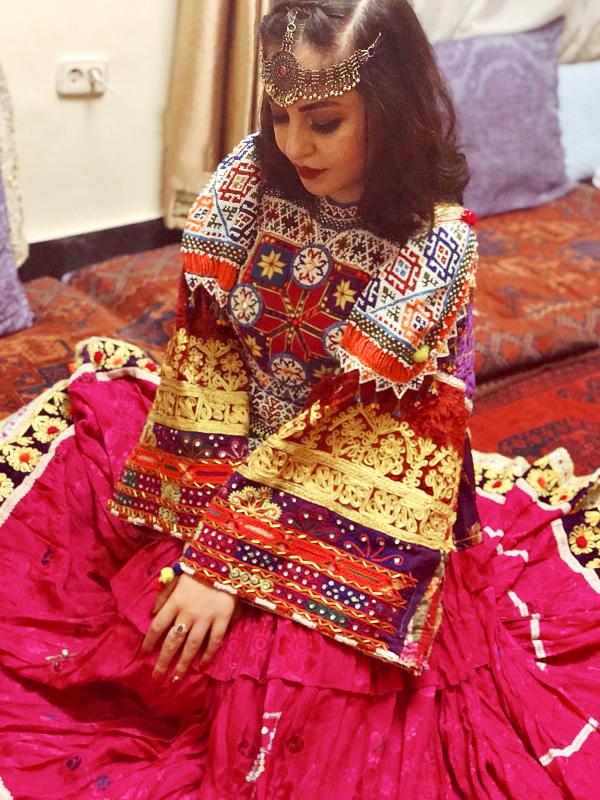Afghan youth rights activist Wazhma Sayle says she was shocked to see a photograph online, apparently of women dressed in black all-enveloping niqabs and gowns, staging a demonstration in support of the country’s new Taliban rulers at Kabul University.
The 36-year-old, who is based in Sweden, later posted a photograph of herself on Twitter dressed in a bright green and silver dress captioned: “This is Afghan culture & how we dress! Anything less then this does not represent Afghan women!”
“It’s a fight for our identity,” Sayle said in a telephone interview. “I don’t want to be identified the way Taliban showed me, I cannot tolerate that. These clothes, when I wear them, speak for where I come from.”

Photo: Reuters
Other Afghan women overseas have posted similar pictures, striking a chord in Kabul.
“At least they are able to tell the world that we, the women of Afghanistan, do not support the Taliban,” said Fatima, a 22-year-old in the Afghan capital. “I cannot post such pictures or wear those kind of clothes here anymore. If I did, the Taliban would kill me.”
Many women said they believed the purported protest, which has appeared on social media and in Western media, was staged and that several people dressed in the head-to-toe black burqa gowns were men. Reuters has not verified the authenticity of the pictures.
“It is good our women (overseas) were able to protest about it,” said Khatima, another young woman in Kabul. “The reality is, the burqa is not representative of women in Afghanistan.”
When the Taliban was in power two decades ago, women had to cover themselves from head to toe. Those who broke the rules sometimes suffered humiliation and public beatings by the Taliban’s religious police.
While the new Taliban regime has promised to allow women more freedoms, there have been reports of women being barred from going to work, and some being beaten in recent weeks for protesting Taliban rule.
Universities have installed curtains inside classrooms to segregate men and women.
The online campaign with hashtags such as #DoNotTouchMyClothes and #AfghanistanCulture began when US-based Afghan historian Bahar Jalali tweeted to criticise the black garments worn by the university demonstrators.
“No woman has ever dressed like this in the history of Afghanistan. This is utterly foreign and alien to Afghan culture,” she said.
Jalali then posted a photograph of herself in a green dress with the caption, “This is Afghan culture,” and urged others to post too. Dozens of women did.
“We don’t want the Taliban to dictate what Afghan women are,” said Lema Afzal, a 25-year-old Afghan student in Belgium.
Afzal, born in Afghanistan under the first Taliban rule that lasted from 1996 to 2001, said she was horrified when she saw the picture of the black-clad demonstrators.
Her mother had worn the long blue burqa gowns forced upon women at the time and found it hard to breathe or see from under them, she said.
“The picture made me worried that history is repeating itself. My mom’s family didn’t cover their heads at all in the 70s and 80s, when it was fancy to be wearing mini skirts in Afghanistan.”

June 9 to June 15 A photo of two men riding trendy high-wheel Penny-Farthing bicycles past a Qing Dynasty gate aptly captures the essence of Taipei in 1897 — a newly colonized city on the cusp of great change. The Japanese began making significant modifications to the cityscape in 1899, tearing down Qing-era structures, widening boulevards and installing Western-style infrastructure and buildings. The photographer, Minosuke Imamura, only spent a year in Taiwan as a cartographer for the governor-general’s office, but he left behind a treasure trove of 130 images showing life at the onset of Japanese rule, spanning July 1897 to

One of the most important gripes that Taiwanese have about the Democratic Progressive Party (DPP) is that it has failed to deliver concretely on higher wages, housing prices and other bread-and-butter issues. The parallel complaint is that the DPP cares only about glamor issues, such as removing markers of Chinese Nationalist Party (KMT) colonialism by renaming them, or what the KMT codes as “de-Sinification.” Once again, as a critical election looms, the DPP is presenting evidence for that charge. The KMT was quick to jump on the recent proposal of the Ministry of the Interior (MOI) to rename roads that symbolize

On the evening of June 1, Control Yuan Secretary-General Lee Chun-yi (李俊俋) apologized and resigned in disgrace. His crime was instructing his driver to use a Control Yuan vehicle to transport his dog to a pet grooming salon. The Control Yuan is the government branch that investigates, audits and impeaches government officials for, among other things, misuse of government funds, so his misuse of a government vehicle was highly inappropriate. If this story were told to anyone living in the golden era of swaggering gangsters, flashy nouveau riche businessmen, and corrupt “black gold” politics of the 1980s and 1990s, they would have laughed.

In an interview posted online by United Daily News (UDN) on May 26, current Chinese Nationalist Party (KMT) Chairman Eric Chu (朱立倫) was asked about Taichung Mayor Lu Shiow-yen (盧秀燕) replacing him as party chair. Though not yet officially running, by the customs of Taiwan politics, Lu has been signalling she is both running for party chair and to be the party’s 2028 presidential candidate. She told an international media outlet that she was considering a run. She also gave a speech in Keelung on national priorities and foreign affairs. For details, see the May 23 edition of this column,